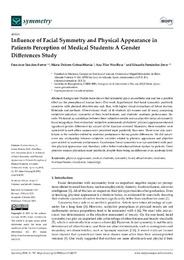Por favor, use este identificador para citar o enlazar este ítem:
https://hdl.handle.net/11000/33099Registro completo de metadatos
| Campo DC | Valor | Lengua/Idioma |
|---|---|---|
| dc.contributor.author | Sánchez Ferrer, Francisco | - |
| dc.contributor.author | Grima Murcia, Mª Dolores | - |
| dc.contributor.author | Nso-Roca, Ana Pilar | - |
| dc.contributor.author | Fernández Jover, Eduardo | - |
| dc.contributor.other | Departamentos de la UMH::Farmacología, Pediatría y Química Orgánica | es_ES |
| dc.contributor.other | Departamentos de la UMH::Histología y Anatomía | es_ES |
| dc.date.accessioned | 2024-09-13T10:56:57Z | - |
| dc.date.available | 2024-09-13T10:56:57Z | - |
| dc.date.created | 2023-03-23 | - |
| dc.identifier.citation | Symmetry 2023, 15, 787 | es_ES |
| dc.identifier.issn | 2073-8994 | - |
| dc.identifier.uri | https://hdl.handle.net/11000/33099 | - |
| dc.description.abstract | Abstract: Background: Studies have shown that symmetry plays an aesthetic role and has a positive effect on the perception of human faces. Our work hypothesizes that facial symmetry positively correlates with physical attractiveness and, thus, with higher visual evaluations of future doctors. Materials and methods: Observational study of 46 students (26 women and 20 men), comparing subjective indicators, symmetry of their facial features, and students’ academic performance. Results: We found no correlation between these subjective results and an objective factor of symmetry facial recognition. User evaluators’ subjective assessments of students’ physical appearance showed significant gender differences for almost all the domains assessed. Moreover, these variables were correlated to each other: women were perceived more positively than men. There were also correlations in the variables related to academic performance but no gender differences. We did not observe any relationship between subjective variables related to physical appearance and objective ones related to academic performance. Conclusion: Facial symmetry was not correlated with positive physical appearance and, therefore, with a better evaluation of future doctors by patients. Users perceive women physicians more positively, despite there being no difference at an academic level. | es_ES |
| dc.format | application/pdf | es_ES |
| dc.format.extent | 12 | es_ES |
| dc.language.iso | eng | es_ES |
| dc.publisher | Multidisciplinary Digital Publishing Institute (MDPI) | es_ES |
| dc.rights | info:eu-repo/semantics/openAccess | es_ES |
| dc.rights | Attribution-NonCommercial-NoDerivatives 4.0 Internacional | * |
| dc.rights.uri | http://creativecommons.org/licenses/by-nc-nd/4.0/ | * |
| dc.subject | physical appearance | es_ES |
| dc.subject | medical students | es_ES |
| dc.subject | symmetry facial | es_ES |
| dc.subject | attractiveness | es_ES |
| dc.subject | kindness | es_ES |
| dc.subject | trustworthiness | es_ES |
| dc.subject | cleanliness | es_ES |
| dc.subject | knowledge | es_ES |
| dc.subject.other | CDU::6 - Ciencias aplicadas::61 - Medicina::611 - Anatomía | es_ES |
| dc.title | Influence of Facial Symmetry and Physical Appearance in Patients Perception of Medical Students: A Gender Differences Study | es_ES |
| dc.type | info:eu-repo/semantics/article | es_ES |
| dc.contributor.institute | Institutos de la UMH::Instituto de Bioingeniería | es_ES |
| dc.relation.publisherversion | https://doi.org/10.3390/ sym15040787 | es_ES |

Ver/Abrir:
Influence of Facial Symmetry and Physical Appearance in Patients Perception of Medical Students.pdf
1,42 MB
Adobe PDF
Compartir:
 La licencia se describe como: Atribución-NonComercial-NoDerivada 4.0 Internacional.
La licencia se describe como: Atribución-NonComercial-NoDerivada 4.0 Internacional.
.png)